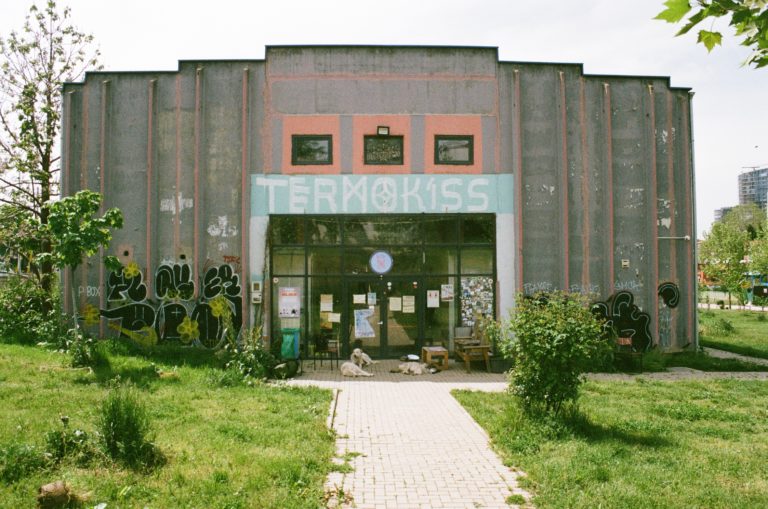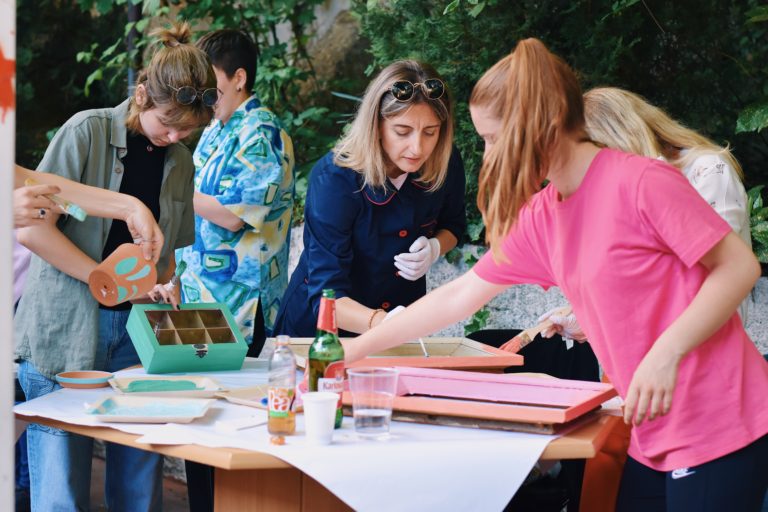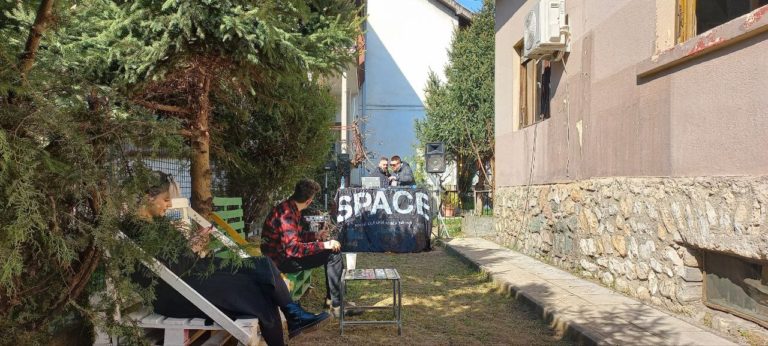Author: Étienne Vernat
In the aftermath of Yugoslavia's breakup, southern Europe witnessed a clash between capitalism and Balkan traditions, prompting the emergence of cultural collectives reclaiming abandoned spaces. Supported by Belgian association Toestand, groups like Termokiss in Kosovo and DKC Sarajeva in Bosnia-Herzegovina foster solidarity through collaborative projects and mutual aid. Facing financial challenges and political resistance, these collectives prioritise independence while challenging nationalist narratives.
Capitalism brutally hit southern Europe when Yugoslavia broke up in the 1990s-2000s, resulting in a surprising combination of the disappearance of communist vestiges and the reassertion of traditional Balkan conformism. In this landlocked region between the Balkan Mountain range and the Mediterranean Sea, three independent groups stand out when it comes to cultural initiatives: Space Tetova in North Macedonia, Termokiss in Kosovo and DKC Sarajeva in Bosnia-Herzegovina. All three are embedded in a collaborative network led by an independent Belgian association, Toestand, which fights for the legal right of such cultural collectives to occupy disused buildings. As common as squatting may be in Western Balkan countries such as Croatia or Slovenia, occupying obscure locations further east in often tense political contexts often leads to a lack of understanding from a part of the population.
Thanks to the exchanges and workshops organised by Toestand as part of an EU-backed international project, the three collectives have also developed a real sense of mutual aid, which is key to any culture and solidarity-based renovation project in abandoned places.

Termokiss' venue in Prishtina – © Étienne Vernat
Jointly-built activities
While new buildings are springing up on the outskirts of Prishtina, Kosovo, new social spaces are being created away from the commercial areas, as Termokiss meets the needs of an eagerly expressive youth. The centre was born out of the ashes of an abandoned factory project, like many others in this region, where nepotism has left unfinished buildings littering the streets. The wasteland was restored in 2016 at the instigation of the Belgian association Toestand to help a local volunteer collective, thanks to the help of dozens of local and international volunteers. This cultural centre, which has a 3-year renewable lease agreement with the town council, can now host concerts, exhibitions, and theatre performances. On weekdays and weekends, the place is alive with artists, architects, musicians, and activists. “This place is like no other. We don't charge any entry fees and everyone's welcome–even the stray dogs that live around,” says Era, a cornerstone of Termokiss.
Like the other associations supported by Toestand, Termokiss is structured horizontally, giving priority to the initiatives of its members and the people in the neighbourhood. "Anyone can initiate a project. If it's approved in our meeting, we then gather the materials and volunteers that are needed and we just go for it," explains Shpat, a regular volunteer. However, this egalitarian model is hampered by inherent constraints: decision-making is slow and responsibility all too often falls to the most active volunteers.
DKC Sarajeva, a centre based in Sarajevo, Bosnia-Herzegovina, is another example of this decentralised organisation. Like Termokiss, its programme consists entirely of events initiated by residents and sympathisers. DKC offers a collaborative and politically engaged programme: "Fighting against nationalism, racism and supporting LGBTQIA+ and feminist initiatives are our founding principles. All the activities that the centre offers are driven by these values," explains Mahir, who has been volunteering for years.

DKC centre, made of a ten-person original team, a music collective and a theatre company – © DKC Sarajeva
Prior to the establishment of the centre, DKC had engaged in non-violent public actions to challenge the successive governments in Bosnia-Herzegovina about the political exploitation of the memory of the conflict. With its Antifašističko naslijeđe ("Anti-fascist legacy") action, DKC coordinated the cleaning of memorials in order to denounce the instrumentalization of the victims from each community who died as a result of abuses committed during the Second World War. "Mentioning the antifascist legacy in Bosnia is critical," asserts Mahir. The collective stands against the entrenched grievances that have divided the population and that are often perpetuated by the various governments and political parties of the three denominations in Bosnia (Sunni Islam, Catholic and Orthodox Churches).
DKC has also tried to make citizens aware of the stakes involved in public spaces: "What we've planned on doing next is to renovate a park with the help of the people living around to entice the city council into taking the right actions and to spark a public debate." Indeed, since the collapse of the Yugoslav federation, ownership of property has been particularly unclear due to dubious public-private partnerships. "We have to show that forgotten buildings and spaces can be reinvested, so that we can move past the partisan divides that have permeated people's minds, even though it means stepping out of line," Mahir explains. "People here don't really know who the brownfield belongs to and they don't dare to claim their rights to the city councils," he adds.
The cost of independence
These groups are adamant that resisting the prevailing neoliberal policies is the best thing to do against endemic unemployment and the successive financial crises that have forced the youth to migrate westwards. They must therefore juggle between finding sources of funding and protecting their independence. "With the current economic conditions we have to choose between charging more for drinks and opening up to other sources of funding like accepting to let the building to embassies for privatisation–while trying to stay anticapitalist," admits Shpat from Termokiss.
For DKC Sarajeva, the hunt for funding is not an option. In order to remain completely independent, its members prioritise a volunteer-based organisation, appealing for donations from the diaspora and asking people from the neighbourhood to pitch in to keep the place running. But it is not easy for the volunteers to organise indoor and outdoor events without the support of real staff. This is a difficult dilemma that all the structures have to resolve by seeking funding–or not–to maintain coordinating positions.
The members of Space Tetova, a group based in Tetovo, North Macedonia, have had to take a different approach due to a political background that is both deadlocked and picky about the activities of associations. Armend, a founding member of the collective, explains that "there's no cultural activity in Tetova—only cafés and restaurants. Everything is commercial. There's no other choice for Macedonian associations than abiding by imperatives set by international funds."

Launching a party in Space Tetova – © Space Tetova
In each of these areas, any attempt to set up an associative project is tantamount to a militant journey. It is difficult to avoid the influence of political parties, because relying on local financial supporters means being dependent on them. "Everything is partisan here," says Trime, Space Tetova's project coordinator. "You have to rely on local and well-entrenched NGOs if you want to be officially recognised. We can't do without a network, even though we do have the freedom and the right to offer alternative activities!"
In 2021, thanks to Toestand's network, Space Tetova settled down for the first time in a space, leased by the city council supposedly until 2024. The following year the populist and nationalist party was elected on a platform that was the opposite extreme of the collective's cultural programme. The new conservative city council then began to relentlessly harass the volunteer group, going so far as to fabricate child pornography charges by falsifying documents in order to regain possession of the space. "We resisted for a long time," says Armend, "thanks to TV interventions, demonstrations with local inhabitants and support from NGOs and Toestand's network, before shifting strategy."
The cost of independence for this collective has ultimately meant choosing to rent a private space, made possible by subsidies from foreign partners. "Some of our projects had to be redefined in accordance with our financial partners' goals, but the situation is much better than when we had to answer to the authorities for what we did and to invite NGOs that don't share our values," adds Trime. Now their main goal is to find a place to renovate, just like the other structures in the Toestand's network, by taking the right to take possession of a disused building.
Network strength
A soft dynamic unites the volunteers of Termokiss, DKC Sarajeva, and Space Tetova, both in their principles of action and in their cultural and political project. By defending a decentralised system of organisation and the reclaiming of public spaces by citizens, each of them has benefited from Toestand's support in reclaiming disused buildings. As with Termokiss, DKC Sarajeva, and Space Tetova, each year a new project is selected and the network’s volunteers then travel to the designated country to help out with jointly chosen rehabilitation project. Despite the painful memories of the community divisions of the 1990s and a wider European context of creeping nationalism, more and more young volunteers join the network each year.
Mahir from DKC sums it up: "Once we've got an international network we can rely on other people with similar experiences." When Space Tetova got almost forcibly kicked out of their first centre, all the other structures in Prishtina, Brussels, and Sarajevo swung into action and informed their embassies in Macedonia for them to pressure Tetovo's city council. He adds that, "as part of the European project led by Toestand, it's key for all of us to meet, exchange about our practices and confront the walls that each collective hits in its own specific context. This is where international projects demonstrate their positive impacts at all the organizations' levels. We feel united while getting our skills improved. Here in the Balkans, we often lack this one final impetus needed to bring initiatives to life."
Only a few collectives have had to close their rehabilitated spaces due to strong political opposition or lack of funding. Yet they still join the network every year to help partners open a new space, as they did last July in Montenegro for a collective called SCS Podgorica. Over the years, these gatherings have fuelled a unique youth movement that is shattering the ideological conceptions inherited from the past. The volunteers of this network, which has yet to gain a wider public profile, are determined to shatter the rigid customs of their societies and rally their fellow citizens around their values of independence, tolerance, and celebration.
Published on May 23rd, 2024
About the author:
Étienne Vernat is a Social and Solidarity Economy worker and has been writing for the last few years for various webzines around musical trends and talents. His writings are mainly focused on his travels in different countries, where he tries to discover new alternative projects to put the spotlight on.
Translation: Alix Robichon